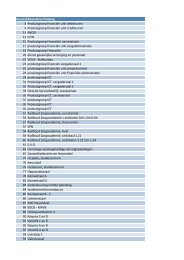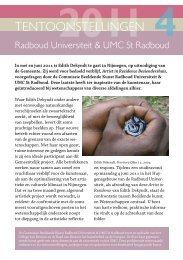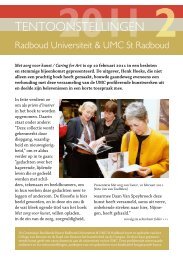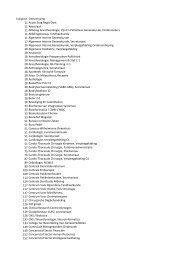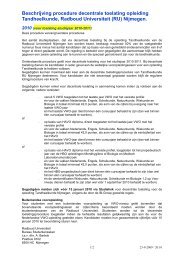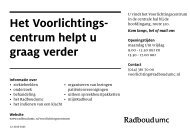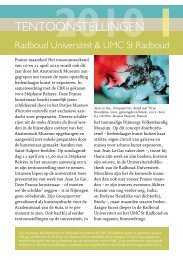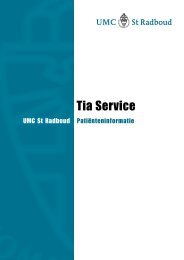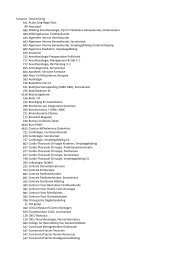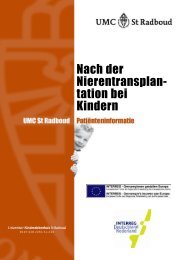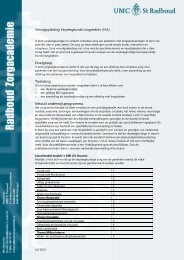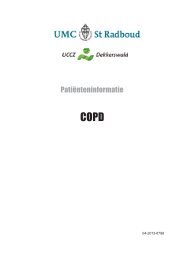Neuralgic Amyotrophy: idiopathic and hereditary ... - UMC St Radboud
Neuralgic Amyotrophy: idiopathic and hereditary ... - UMC St Radboud
Neuralgic Amyotrophy: idiopathic and hereditary ... - UMC St Radboud
Create successful ePaper yourself
Turn your PDF publications into a flip-book with our unique Google optimized e-Paper software.
How do I manage this?<br />
I have been given help at home, something I initially had problems with because<br />
I’m a ‘do-it-yourself’ person. If I am in a lot of pain, I can, however, now let things<br />
roll off me much more easily. The pain fluctuates, as well. Sometimes, I get up<br />
<strong>and</strong> then I feel that I am going to have an ‘off-day.’ In that case, I won’t be able to<br />
do much <strong>and</strong> will have to rest a lot. But I also have days when I can certainly get<br />
things done: hang up the laundry; lift heavy things, such as a full pan, a coffee<br />
or teapot or a vase of flowers. Those types of actions have, however, become<br />
extremely difficult.<br />
How I care for myself has also changed. Putting on pantyhose, underwear <strong>and</strong><br />
shoes, washing <strong>and</strong> combing my hair have all become difficult. I see now that I put<br />
on jackets <strong>and</strong> blouses differently; in short, there are a great many limitations in<br />
my life now. Sleeping is also one of them. The pillow is thrown out of the bed <strong>and</strong><br />
put back at least ten times per night <strong>and</strong> I can no longer sleep very well on my left<br />
side. Sitting is only comfortable if I have sufficient support for my left shoulder; I<br />
absolutely cannot tolerate any pressure on my arm or head or a strange position,<br />
at all.<br />
How do those around me experience this?<br />
It dominates part of our lives. The care that my husb<strong>and</strong> <strong>and</strong> children provide for<br />
me has become different. They clean up more after themselves <strong>and</strong> they are continually<br />
thinking about how they can make it easier for me. They help where they<br />
can, when they have time.<br />
Within the family, they always ask about my health. This is logical <strong>and</strong> normal but it<br />
is also sometimes ‘annoying’. There are so many other things, better things, in life.<br />
Future<br />
Sometimes, I worry a great deal about the future. If this continues like this – getting<br />
one attack after another – I will have to keep taking medication. If the symptoms<br />
of paralysis occur more often <strong>and</strong> get worse, what then?<br />
As long as it is possible, I want to keep doing everything that I can, everything I<br />
am allowed to do <strong>and</strong> whatever is possible. I try to maintain a positive attitude as<br />
much as possible, for myself <strong>and</strong> for others.<br />
I am not strong, but I am certainly very tenacious!<br />
28<br />
Hereditary neuralgic amyotrophy (HNA)<br />
Experience of a patient, born in 1964<br />
How HNA started <strong>and</strong> what precisely caused it is not completely clear to me. What<br />
I can say is that, in the four experiences that I have had thus far, the muscles that<br />
are affected continue to feel tired for a number of weeks (around two to four), resembling<br />
the fatigue after playing intensive sports. This fatigue decreases gradually<br />
to a nagging pain that is constantly present.<br />
After two to four weeks, I notice that the pain is abnormal (too constant <strong>and</strong> too<br />
severe) <strong>and</strong> then I start to suspect that it could be HNA. After around four to six<br />
weeks, the pain is so present <strong>and</strong> severe that normal functioning is barely (or<br />
not at all) possible anymore (at work <strong>and</strong> in private life). I become irritable <strong>and</strong><br />
drained; I lose interest in everything, until the pain, from one moment to the next,<br />
is gone; at least this is how it seems. I think that this is a period of a couple of<br />
days in which the pain subsides <strong>and</strong> the muscle paralysis sets in.<br />
Alongside the muscle paralysis, I am greatly hindered by a numbness of the skin.<br />
It is always at the place where the paralysis was. The recovery after a paralysis in<br />
the arms takes around a year (90%). The final 10% of recovery takes a number<br />
of years <strong>and</strong> is dependent upon the degree to which the paralysed muscles are<br />
used.<br />
How does HNA manifest itself?<br />
In my case, I have had three attacks in one arm <strong>and</strong> one attack in the area of the<br />
vocal cords.<br />
Year: Where: Recovery:<br />
1977 Right arm, complete, including numb skin on forearm <strong>and</strong> h<strong>and</strong> one year<br />
1985 Left arm, complete, including numb skin on forearm <strong>and</strong> h<strong>and</strong> one year<br />
2000 Left arm partial, including numb forearm on inside three months<br />
2000 Both vocal cords (inability to talk for six months) <strong>and</strong><br />
part of oesophagus six months.<br />
What now?<br />
One can live with HNA. I do notice every time that the recovery is less complete.<br />
I have had two attacks in my left arm; it is also my worst arm. Some arm movements<br />
remain difficult. Physical therapy can help one to recover as much as<br />
possible after an attack. Perseverance <strong>and</strong> (sensible) exercise have been, in my<br />
29



